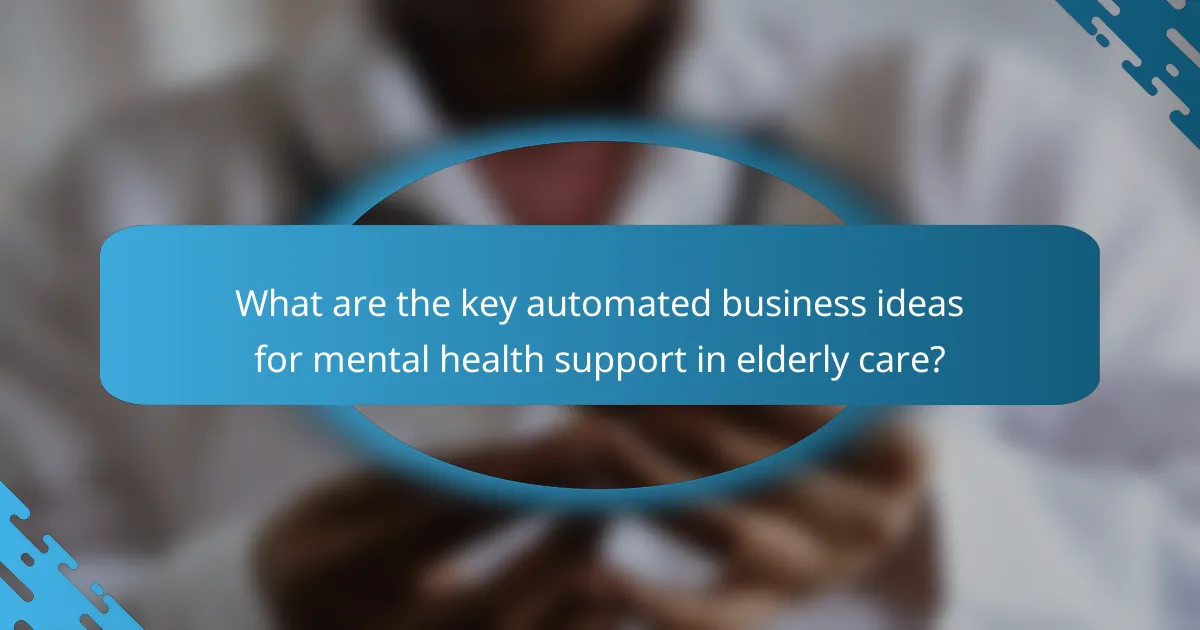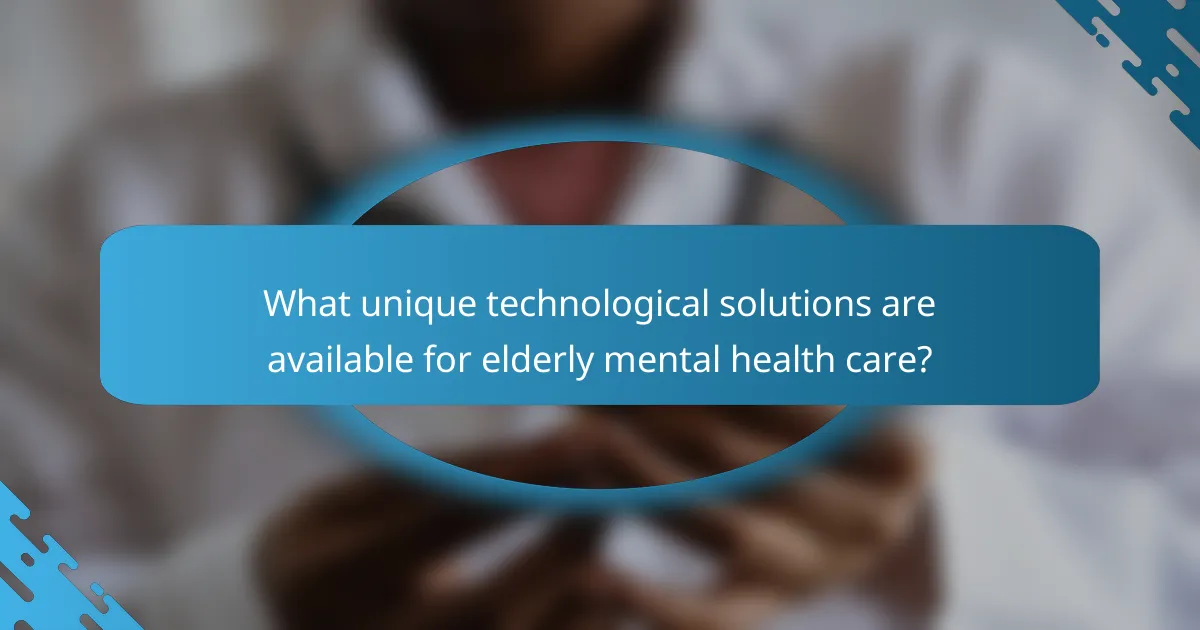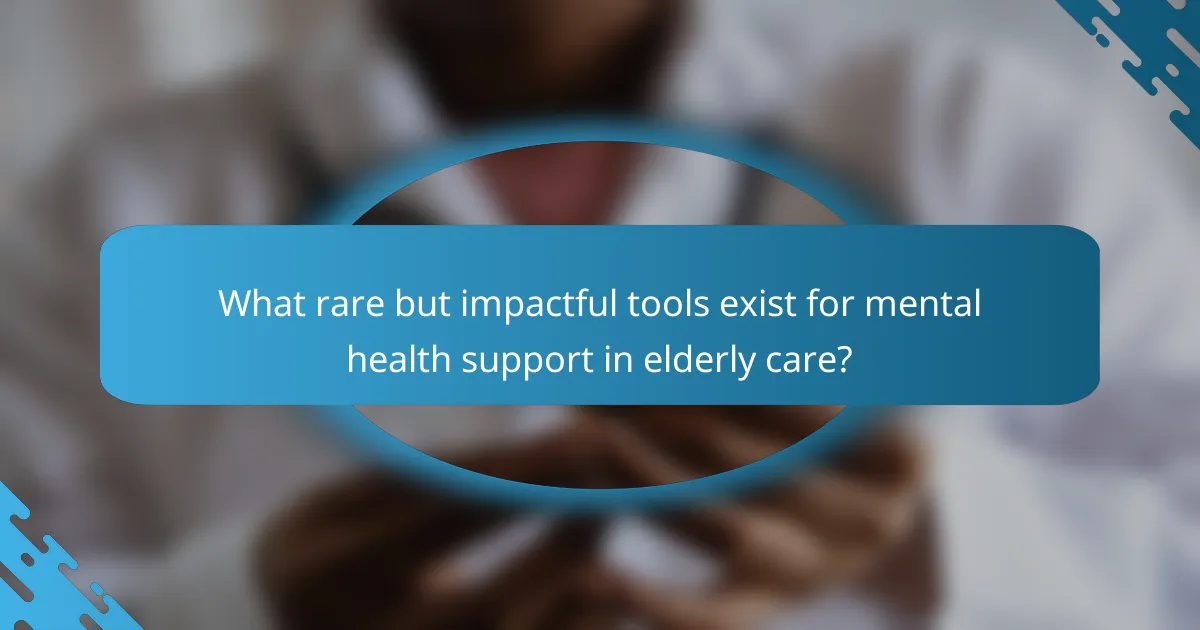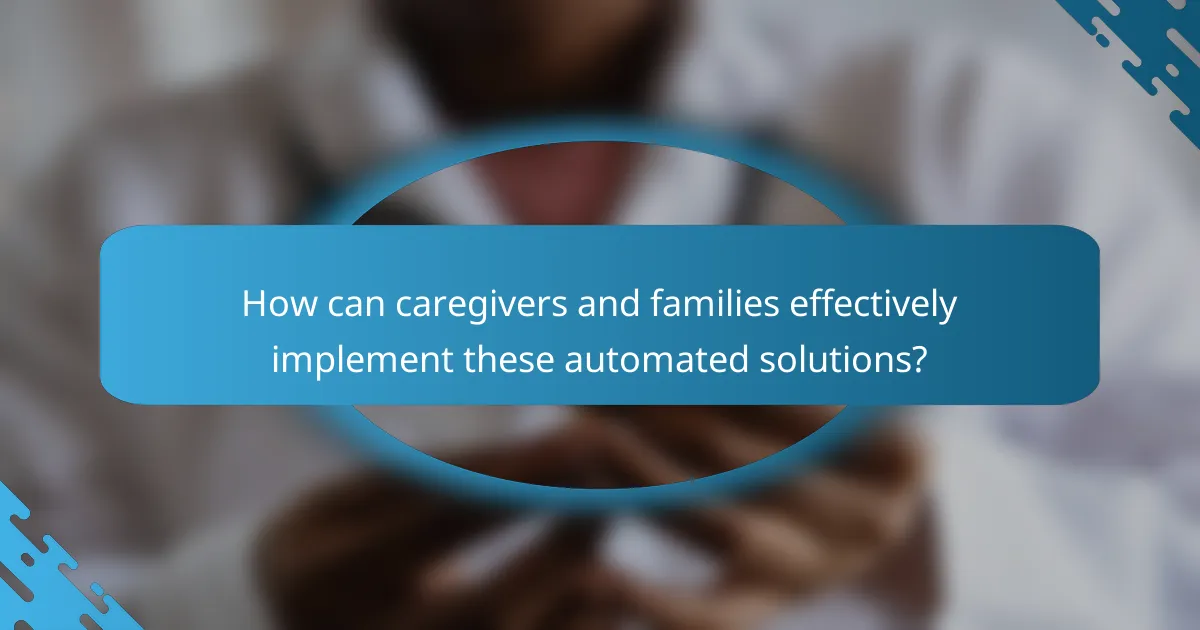Automated business ideas for mental health support significantly enhance elderly care by improving accessibility and engagement. Virtual therapy platforms and AI-driven wellness apps offer personalised mental health solutions. Telehealth consultations and automated reminders ensure timely interventions and medication adherence. Digital companionship services and online support groups foster community and reduce loneliness among seniors.

What are the key automated business ideas for mental health support in elderly care?
Automated business ideas for mental health support in elderly care include virtual therapy platforms, AI-driven wellness apps, digital companionship services, telehealth consultations, automated reminders for medication, and online support groups. These solutions enhance accessibility, improve mental well-being, and foster community engagement among seniors. Virtual therapy platforms offer personalised sessions, while AI-driven wellness apps provide tailored mental health exercises. Digital companionship services use AI to reduce loneliness. Telehealth consultations ensure timely access to professionals, and automated reminders help maintain medication adherence. Online support groups create safe spaces for sharing experiences.
How can technology enhance mental health support for the elderly?
Technology can significantly enhance mental health support for the elderly by providing accessible resources and personalised care. Telehealth platforms allow seniors to connect with mental health professionals without leaving home, ensuring convenience and comfort. Mobile applications offer mood tracking and mindfulness exercises, promoting self-management of mental well-being. Virtual reality experiences can create immersive environments for relaxation and cognitive stimulation, addressing anxiety and loneliness. Additionally, AI-driven chatbots can provide immediate support and companionship, fostering emotional connections. These innovations empower elderly care, making mental health resources more effective and engaging.
What types of applications are most effective?
Automated applications that enhance mental health support for the elderly include teletherapy platforms, wellness tracking apps, and social engagement tools. Teletherapy platforms provide direct access to mental health professionals, improving care accessibility. Wellness tracking apps monitor emotional well-being, offering personalised insights. Social engagement tools facilitate connections, reducing loneliness and fostering community. Each application type uniquely addresses the mental health challenges faced by the elderly, enhancing their quality of life through technology.
How do virtual therapy sessions work?
Virtual therapy sessions utilise digital platforms to connect therapists and clients remotely. These sessions often involve video conferencing, allowing for real-time interaction. Clients can access mental health support from the comfort of their homes, which is particularly beneficial for the elderly who may face mobility challenges. The convenience and accessibility of virtual sessions can enhance engagement and adherence to treatment plans. Additionally, these sessions can be tailored to individual needs, offering various therapeutic approaches like cognitive behavioural therapy or mindfulness practices.
What are the benefits of automated mental health support for the elderly?
Automated mental health support enhances elderly care by providing accessible, personalised assistance. Key benefits include improved emotional well-being, reduced feelings of loneliness, and increased engagement in mental health activities. Additionally, these systems offer timely interventions, ensuring that seniors receive support when needed. Studies show that technology-driven solutions can significantly lower anxiety and depression rates among the elderly, promoting healthier aging.
How does accessibility improve with technology?
Technology enhances accessibility in elderly care by providing tailored mental health support solutions. Automated systems facilitate communication, enabling seniors to access resources easily. Telehealth platforms allow remote consultations, improving service reach. Wearable devices monitor health metrics, ensuring timely interventions. These innovations empower elderly individuals to maintain independence while receiving necessary support.
What impact does automation have on caregiver workload?
Automation significantly reduces caregiver workload by streamlining tasks and enhancing efficiency. Automated systems can manage scheduling, medication reminders, and data tracking, allowing caregivers to focus on direct patient interaction. As a result, caregivers experience less stress and improved job satisfaction. Automation also supports better communication between caregivers and healthcare providers, ensuring timely interventions. Overall, technology empowers caregivers, allowing them to deliver higher quality care while managing their responsibilities more effectively.

What unique technological solutions are available for elderly mental health care?
Telehealth platforms, wearable devices, and AI-driven chatbots are unique technological solutions enhancing elderly mental health care. Telehealth platforms provide remote therapy sessions, improving access and convenience. Wearable devices monitor health metrics and alert caregivers to changes, fostering proactive support. AI-driven chatbots offer 24/7 companionship, reducing feelings of loneliness. These innovations empower elderly individuals by facilitating timely interventions and enhancing mental well-being.
How do AI-driven chatbots assist in mental health support?
AI-driven chatbots provide accessible mental health support by offering immediate responses and resources. They help elderly individuals by facilitating communication, reducing feelings of isolation, and providing tailored advice based on user input. These chatbots can also track emotional trends, providing valuable insights to caregivers. As a result, they enhance overall mental well-being and support systems for the elderly.
What role do wearable devices play in monitoring mental health?
Wearable devices significantly enhance mental health monitoring by providing real-time data on emotional and physical states. These devices can track biometrics, such as heart rate and sleep patterns, which correlate with mental well-being. As a result, caregivers can identify early signs of distress in elderly individuals. Unique features, like mood tracking apps integrated with wearables, offer personalised insights and recommendations. This technology empowers both seniors and caregivers, fostering proactive mental health management.
What features should be included in a mental health monitoring device?
A mental health monitoring device should include features such as real-time mood tracking, user-friendly interface, emergency alert systems, and data sharing capabilities. These attributes enhance user engagement and provide crucial support for elderly care.
Key features can be summarised as follows:
– Real-time mood tracking | Monitors emotional states continuously
– User-friendly interface | Simplifies navigation for elderly users
– Emergency alert systems | Provides immediate assistance in crises
– Data sharing capabilities | Enables communication with caregivers and healthcare professionals
– Customisable reminders | Supports medication adherence and appointments
– Privacy controls | Ensures user data is secure and confidential
How can telehealth platforms be optimised for elderly users?
Telehealth platforms can be optimised for elderly users by enhancing usability, accessibility, and engagement. Simple interfaces facilitate navigation, while voice commands support those with limited tech skills.
Training sessions for caregivers ensure effective use of these platforms. Regular feedback from elderly users helps refine features tailored to their needs.
Integrating reminders for medication and appointments keeps users engaged. Offering virtual social activities combats loneliness, fostering a sense of community.
Data security is crucial; ensuring privacy builds trust among elderly users. These strategies collectively empower elderly care through effective telehealth solutions.

What rare but impactful tools exist for mental health support in elderly care?
Automated tools for mental health support in elderly care include telehealth platforms, AI-powered chatbots, and virtual reality therapy. These tools enhance accessibility and engagement while providing personalised support.
Telehealth platforms allow for remote consultations, improving access to mental health professionals. AI-powered chatbots offer 24/7 support, delivering immediate responses to emotional distress. Virtual reality therapy creates immersive environments for therapeutic experiences, promoting relaxation and reducing anxiety.
These rare tools significantly impact mental health outcomes by increasing engagement and providing tailored interventions. They empower elderly individuals to manage their mental health more effectively through innovative technology.
What emerging technologies show promise for mental health interventions?
Automated technologies show promise in enhancing mental health support for the elderly. Telehealth platforms enable remote therapy, while AI-driven chatbots provide instant emotional support. Wearable devices monitor mental health metrics, offering real-time data to caregivers. Virtual reality creates immersive environments for therapy, reducing anxiety and improving engagement. These innovations empower elderly care by increasing access and personalisation of mental health interventions.
How can virtual reality be utilised for therapy?
Virtual reality can significantly enhance therapy by providing immersive experiences that support mental health. It enables elderly individuals to engage in therapeutic activities tailored to their needs. For example, VR can simulate real-world scenarios, helping users confront fears or practice social skills in a safe environment. This technology fosters emotional connection and reduces feelings of isolation, which are common in elderly care. As a result, virtual reality serves as a unique and effective tool in mental health support, promoting well-being and improving quality of life.
What are the ethical considerations of using AI in elderly mental health?
The ethical considerations of using AI in elderly mental health include privacy, consent, and bias. Ensuring data protection is crucial as sensitive information is involved. Informed consent must be obtained, particularly from individuals with cognitive impairments. Additionally, AI systems may inadvertently reflect biases present in training data, potentially leading to unequal care. Addressing these issues is essential for equitable and effective mental health support.

How can caregivers and families effectively implement these automated solutions?
Caregivers and families can implement automated solutions for mental health support by integrating user-friendly technology into daily routines. Start by selecting tools that enhance communication, such as video conferencing platforms or mental health apps. Provide training to ensure all users are comfortable with the technology. Regularly assess the effectiveness of these tools through feedback from users and adjust as necessary. Emphasise the importance of consistency in usage to maximise benefits for elderly care.
What best practices should be followed for integrating technology in elderly care?
Integrating technology in elderly care requires adherence to several best practices. Focus on user-friendly interfaces to ensure ease of use for seniors. Prioritise privacy and security to protect sensitive health information. Implement training programmes for caregivers to enhance technology adoption. Use data analytics to personalise care plans, improving mental health support. Foster collaboration among healthcare providers, families, and technology developers for holistic solutions.
What common mistakes should be avoided when adopting mental health tech?
To avoid common mistakes when adopting mental health tech, ensure proper training for staff, prioritise user-friendly interfaces, and maintain data privacy. Neglecting these areas can lead to ineffective implementation and reduced user trust. Additionally, avoid overcomplicating technology, as simplicity enhances engagement and accessibility for elderly care.
How can feedback from elderly users improve technology design?
Feedback from elderly users enhances technology design by ensuring usability and relevance. Their insights reveal unique needs, preferences, and challenges faced in daily life. Incorporating this feedback leads to user-friendly interfaces and features tailored to improve mental health support. For instance, adjustments based on their experiences can enhance accessibility and engagement, fostering a more supportive environment. This iterative design process ultimately empowers elderly care through technology, addressing specific mental health concerns effectively.
What resources are available for ongoing support and education?
Various resources are available for ongoing support and education in automated business ideas for mental health support. Online platforms offer training modules focused on technology integration in elderly care. Community workshops provide hands-on experience with mental health tools. Professional organisations often host webinars discussing best practices. Additionally, peer support groups enable sharing of experiences and strategies.